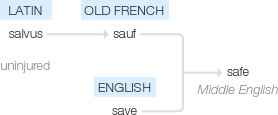Safe
Middle English (as an adjective): from Old French sauf, from Latin salvus ‘uninjured’. The noun is from the verb save1, later assimilated to the adjectival form.
wiktionary
From Middle English sauf, safe, saf, saaf, from Old French sauf, saulf, salf(“safe”), from Latin salvus(“whole, safe”), from Proto-Indo-European *solh₂-(“whole, every”).
etymonline
safe (adj.)
c. 1300, "unscathed, unhurt, uninjured; free from danger or molestation, in safety, secure; saved spiritually, redeemed, not damned;" from Old French sauf "protected, watched-over; assured of salvation," from Latin salvus "uninjured, in good health, safe," related to salus "good health," saluber "healthful," all from PIE *solwos from root *sol- "whole, well-kept."
As a quasi-preposition from c. 1300, on model of French and Latin cognates. From late 14c. as "rescued, delivered; protected; left alive, unkilled." Meaning "not exposed to danger" (of places) is attested from late 14c.; of actions, etc., "free from risk," first recorded 1580s. Meaning "sure, reliable, not a danger" is from c. 1600. Sense of "conservative, cautious" is from 1823. Paired alliteratively with sound (adj.) from late 14c. The noun safe-conduct (late 13c.) is from Old French sauf-conduit (13c.).
safe (n.)
"chest for keeping food or valuables," early 15c., save, from French en sauf "in safety," from sauf (see safe (adj.)). Spelling with -f- first recorded 1680s, from influence of safe (adj.).
